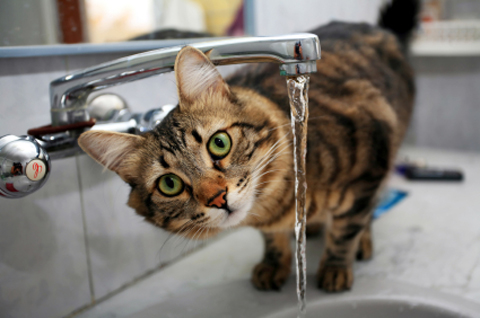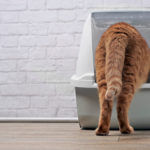What do my cat’s kidneys do?
Kidneys have many functions, including removing nitrogenous waste products from the blood stream, maintaining electrolytes at the correct level, regulating fluid balance within the body and producing hormones.
What is chronic renal failure (CRF)?
As chronic renal failure (CRF) is most commonly seen in old cats, early signs of disease such as weight loss and poor coat quality are often put down to normal aging.
At least 70% of the kidneys need to be dysfunctional before clinical signs of kidney failure are seen. In many cases this means that the damage to the kidneys has been occurring over a number of months or years before failure is evident.
In the initial stages of disease the kidneys increase the functional capacity of the remaining kidney tissue, however, at some point this is no longer possible resulting in a relatively rapid rise in waste products in the bloodstream and an apparent sudden onset of disease.
What are the causes of CRF?
A large number of different disease processes can eventually lead to CRF including:
1. Congenital (birth) malformations of the kidneys
2. Bacterial infections (pyelonephritis).
3. Damage to the filtration membrane (glomerulonephritis).
4. Neoplasia (cancer)
5. Amyloidosis. This is the build up of an unusual material in the kidney which prevents the kidney from functioning normally.
6. Viral infections e.g. feline immunodeficiency virus (FIV) or feline infectious peritonitis virus (FIP).
7. Kidney stones
8. Toxins
9. Drug reactions
10. Untreated high blood pressure
How is the disease diagnosed?
Renal failure is usually diagnosed by looking at the level of two waste products in the bloodstream, (blood urea (BUN) and creatinine) and relating then to a concurrent urine analysis. Tests to measure the blood levels of other substances (e.g. potassium, phosphorus and calcium), the red and white blood cell counts and to check for thyroid disease, diabetes and concurrent viral illnesses is imperative in order to determine the best course of treatment. As well as these blood and urine tests, imaging of the kidneys (with x-rays or ultrasound), blood pressure measurements and even biopsy of the kidneys may be required.
How does CRF affect my cat?
Because the kidneys perform a variety of different functions, the clinical signs of kidney failure can be somewhat variable. Things you may notice if your cat has CRF:
-Weight loss
-Dull, lifeless coat
-Halitosis (bad breath)
-Variable appetite which may be associated with mouth ulcers
-Lethargy and depression
-Drinking and/or urinating more
-Vomiting and/or diarrhoea
-Sudden onset blindness (High blood pressure can cause retinal detachment)
-Constipation
What treatments are available?
Depending on the in hospital tests we may be faced with several problems that require different treatments. For each case we will choose from the following treatment/management options:
intravenous fluid therapy : Aids in lowering the level of waste products in the blood stream.
Diets low protein and phosphorus: minimize the build-up of these waste products in the bloodstream. These foods also have extra potassium, vitamins and omega 3s to slow the progression of CRF.
Anti-emetics: To control vomiting and to treat stomach ulceration.
Medications and supplementations: medications may be required, depending on the specific requirements of your cat. In addition any concurrent illnesses will need to be treated.
Surgery: Treatment for any underlying conditions such as kidney infection, stones and tumours may be required.
What follow up is required?
Close monitoring is essential in all cases of CRF. Early detection of problems can allow prompt treatment and prevention of further damage to the kidneys. Monitoring includes:
-Regular clinical examination
-Urine examinations including culture for infections
-Blood tests to monitor progression as well as to measure potassium, phosphate, calcium and red blood cell levels.
-Blood pressure measurement
-Urine protein measurement
How long can I expect my cat to live?
Unfortunately CRF is invariably progressive, however with treatment to slow the ongoing damage, your cat may have several months to years of good quality, active life ahead.
Call the clinic today to speak to one of our friendly staff if you have any concerns or enquiries about your feline friend.






